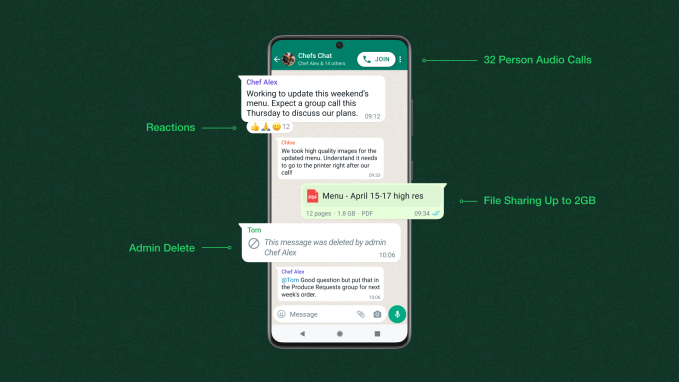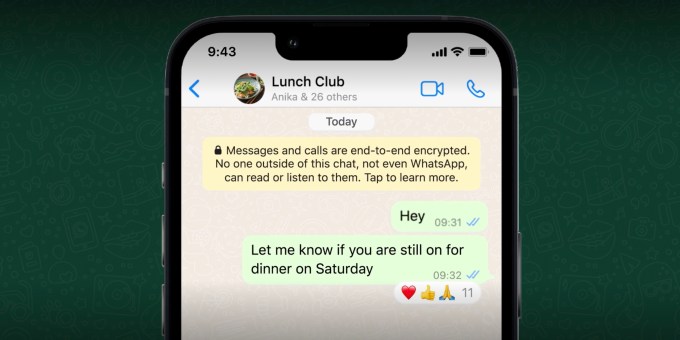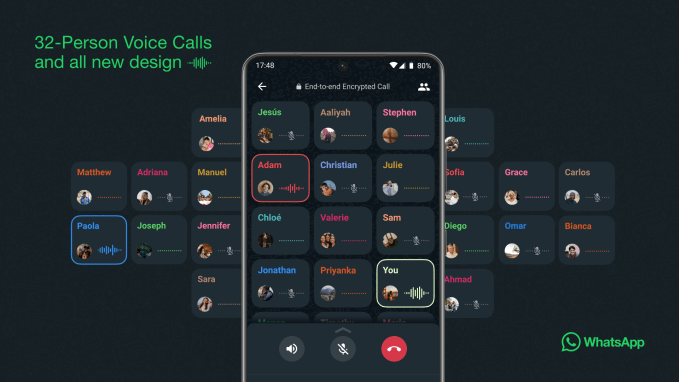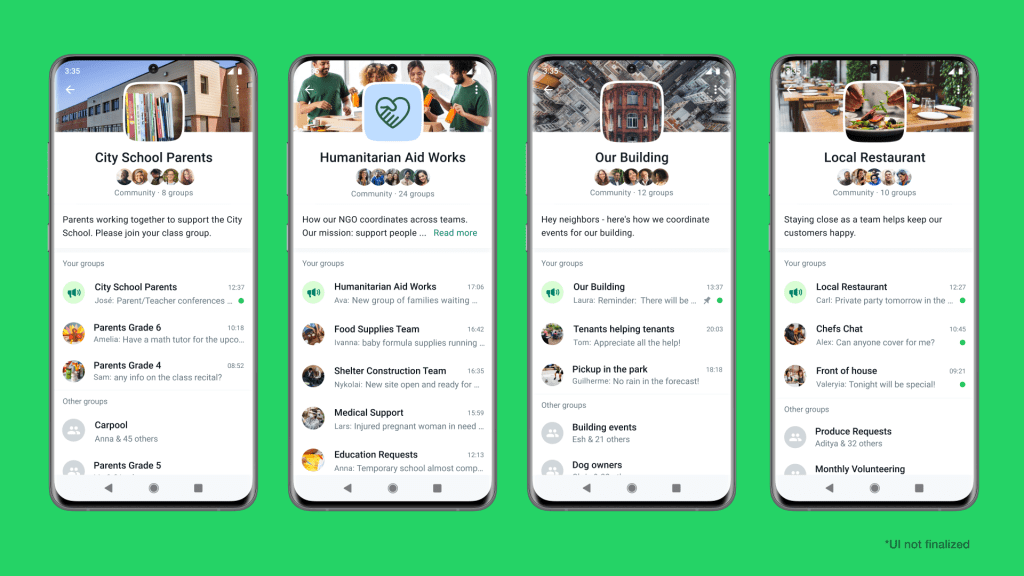Meta is throwing billions of dollars into building out the metaverse as the future of social networking, but in the near term, the tech giant is looking toward the power of messaging to connect users in a more personal way. On that front, the company today introduced its plans for a significant update to its WhatsApp messaging app that will allow users to now not only connect privately with friends and family, as before, but also participate in larger discussion groups, called Communities. These groups aim to serve as a more feature-rich replacement for people’s larger group chats with added support for tools like file sharing, 32-person group calls and emoji reactions, as well as admin tools and moderation controls, among other things.
The feature has been under development for some time as the next big iteration for the WhatsApp platform, meant to capitalize on the app’s existing end-to-end encryption as well as users’ growing desire to join private communities outside of larger social platforms, like Facebook.
In particular, Communities could present a challenge to other messaging apps like Telegram — which has recently become a prominent player in communications related to the Russia-Ukraine war — in addition to other private messaging platforms, like iMessage or Signal, as well as apps like GroupMe, Band, Remind and others used to communicate with groups.
“It’s been clear for a while that the way we communicate online is changing,” wrote Meta CEO Mark Zuckerberg, announcing the news in a post on his public Facebook profile. “Most of us use social networks and feeds to discover interesting content and stay updated. But for a deeper level of interaction, messaging has become the center of our digital lives. It’s more intimate and private, and with encryption it’s more secure too,” he added.

The feature may initially lead to some comparisons with Facebook Groups, a more private networking tool on Facebook that now reaches 1.8 billion users on a monthly basis, per Facebook’s most recent public data. Similar to Groups, WhatsApp Communities would allow organizations, clubs or schools to create networks for their members to interact and share news and updates. And like Facebook Groups recently added, Communities also support the ability to host sub-groups.
For example, a volunteer organization could create a sub-group discussion for those involved with a particular project, like a food drive. A parents group could host sub-groups based on their kids’ ages. A school could include sub-groups for different grades or extracurricular activities. A club could host sub-groups dedicated to planning their various events and activities. And so on.
But while Facebook Groups may see some overlap with WhatsApp Communities, the two are not designed for the same purpose. Facebook’s product is often used by larger, otherwise disconnected strangers who share a common interest. WhatsApp Communities, meanwhile, focus on more private and personal groups — including those where members may already be connected in other ways, including in the real world.
Explains Head of WhatsApp Will Cathcart of the difference, “we’re phone number-based.”
“When you’re interacting with people on WhatsApp, there’s a necessary comfort with exchanging your phone number with them. So that points towards communities where you know these people in real life,” he says. “Maybe you don’t have every phone number of every parent in your kid’s class, but you’re comfortable interacting with them in that way.”

In Communities, users will also be able to see the phone numbers of the others who participate in the sub-groups with them, or when they engage with each other one-on-one. This makes the product feel more personal than something like Facebook Groups.
Another key differentiator between Communities and Facebook Groups is that the latter includes groups that are public or discoverable on the platform. WhatsApp Communities are neither. The company says it will not allow users to search for or discover Communities on its service. You have to be invited to the groups to join them.
To get started with Communities, admins will be able to link a pre-existing group chat to the new feature or create a new group from scratch. WhatsApp believes there are already a large number of group chats that will easily make the transition to the more structured Communities when the feature launches.
“We don’t have a precise number, but when you talk to people in a lot of the countries where WhatsApp is popular, it is really prevalent that people are not, at this point, just using WhatsApp to talk to their family or their friends,” says Cathcart. “They’re using it to talk to their boss and co-workers. They’re using it if they have kids in schools.”
“What we’re doing now is starting to build for organizational use cases with intention,” he says.
Admin tools come to messaging
To grow their groups, admins can add members to Communities individually or they can share an invite link. Helpfully, for clubs and other groups where members come and go, admins have the power to remove individual members from a Community as needed.
Plus, only admins will have the power to share announcements to all Community members through the main announcement group (as it’s called), which will initially support “several thousands” of users. Community members are only able to chat in the smaller groups the admins have created or approved.
WhatsApp will also limit forwards — a way to send messages that often leads to the spread of misinformation and spam. In Communities, messages that have already been forwarded will only be able to be forwarded to one group at a time, rather than the current forward limit of five.
This, along with subgroups, could address the problem of overload that happens today in many group chats where important information gets missed amid the chatter and irrelevant content.

Communities additionally bring other group management tools to messaging, including the ability for group admins to moderate the content. Admins will be able to remove errant or problematic messages or media from everyone’s chat. They’ll also be able to share files up to 2 GB to help groups collaborate and share information. And Communities will be able to host voice calls with up to 32 people for those times when it’s easier to talk live rather than text, the company says.
Users, too, will have control over being added to Communities. In WhatsApp’s settings, users can already decide who can add them to a group chat; now those same settings will apply to Communities, too. Users can report abuse, block accounts and leave Communities when they no longer wish to participate. In Communities, users can silently leave a group, which doesn’t notify the other users as in traditional WhatsApp chats.
While WhatsApp promotes its end-to-end encryption as another reason to use the new discussions feature, the company still has to overcome user hesitancy due to issues regarding its latest attempt at updating its privacy policies. The company faced backlash over its hard-to-understand policy update last year, which is still being examined by some markets’ anti-competition authorities and regulatory bodies, including in the EU and India.
Cathcart says after WhatsApp added more clarity to its policy, a “large, overwhelming percentage of the user base” accepted the update. Anyone who refused just isn’t able to use the new functionality related to businesses. Communities, he notes, won’t require another policy update at this time.
“This fits very closely with what we’ve been doing before. And from a data perspective, this is all end-to-end encrypted on the communications — [it] works very similar to how groups have worked,” he says.
The new feature is not live today. It’s initially being launched into a limited test with select communities to gain further feedback ahead of a public rollout. WhatsApp has not said when the feature will reach the wider public, but notes some of Communities’ new functionality — like reactions, file-sharing, and 32-person calls — will roll out sooner.































Comment